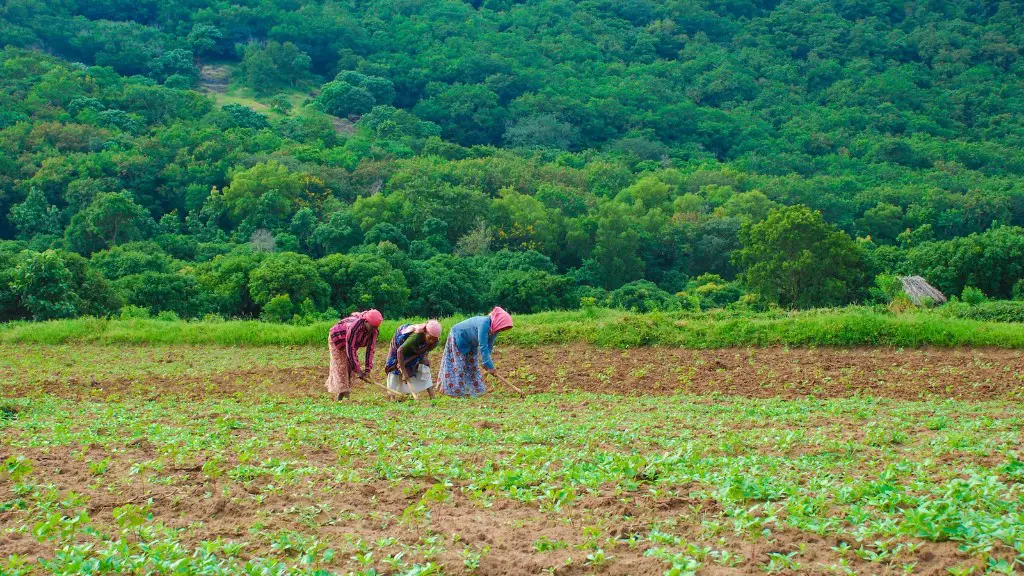In recent years, globalization has had a profound effect on agriculture. The globalization of markets and the increasing integration of economies have spurred the growth of international trade in agricultural products. The expansion of foreign direct investment has also played a role in the globalization of agriculture.
The effects of globalization on agriculture have been mixed. On the one hand, globalization has increased the demand for agricultural products, which has boosted production and incomes for farmers in many countries. On the other hand, globalization has also brought increased competition, which has put downward pressure on prices and profitability in the sector.
In general, the effect of globalization on agriculture has been positive, but there have been some negative consequences as well. The sector has become more efficient and productive, but at the same time, it has become more vulnerable to global economic forces.
The effect of globalization on agriculture has been mixed. On the one hand, globalization has helped to spread improved agricultural technologies and practices around the world, leading to higher yields and increased food security. On the other hand, globalization has also led to the consolidation of the agricultural sector, with a small number of large companies controlling an increasingly large share of the world’s food production. This has put small farmers at a disadvantage, and has made the global food system increasingly vulnerable to shocks.
What is the effect of Globalisation in agriculture?
Globalization has allowed agricultural production to grow much faster than in the past. A few decades ago, fast growth was somewhat over 3 percent per year. Now it is 4 to 6 percent. However, these higher rates of growth involve a substantial change in its composition.
The globalization of business has had a number of effects on the environment. One of the most significant is the increased transport of goods. This has led to an increase in the number of vehicles on the road and in the amount of air and water pollution they produce.
Another effect of globalization is economic specialization. This has led to the loss of many traditional jobs and the increased use of harmful chemicals and pesticides in agriculture. This has had a negative impact on biodiversity, as many species have been driven to extinction.
Finally, globalization has also increased awareness of environmental issues. This has led to the formation of international organizations devoted to protecting the environment, such as the United Nations Environment Programme.
What are the 5 effects of globalization
International expansion can be a great way to grow a business. There are many benefits to expanding into new markets, including access to new cultures, the spread of technology and innovation, lower costs for products, and higher standards of living across the globe. Additionally, expanding into new markets can also provide access to new talent.
While the development of agriculture in a region can have positive effects on the natural life, oxygen production, and climate in the region, it can also lead to negative effects such as inorganic nitrate pollution, pesticide pollution, and salinity problems. These problems can be especially pronounced in regions where agriculture is conducted intensively.
What are the main effects of globalization?
Globalization has caused the cost of manufacturing to decrease overall. This has in turn led to companies being able to sell goods at a lower price point to consumers. The decreased cost of goods is a key aspect that has contributed to increases in the standard of living for consumers. Additionally, consumers have access to a wider variety of goods as a result of globalization.
There are many advantages of globalization, including economic growth, increased global cooperation, and increased cross-border investment. Globalization has helped to bring many different cultures and economies together, and has overall had a positive impact on the world.
What are positive and negative effects of globalization?
There is no denying that globalisation has had a positive impact on the quality of life in many countries around the world. However, there have also been negative impacts, such as increased global inequality, increased corruption, loss of jobs and environmental degradation. It is important to remember that globalisation is a complex phenomenon with both positive and negative consequences.
Globalization has had a positive effect on access to food and education opportunities for people in developing countries. It has also resulted in more scientific research being conducted by a larger community of people. However, globalization has also had some negative effects, such as increasing global warming and lowering production costs of products.
What are the top 3 negative effects of globalization
The disadvantages of globalization are many and varied. One of the most significant is the unequal economic growth that it creates. Globalization has been a driving force behind the growth of the world economy, but this growth has been very uneven. While some countries have experienced rapid economic growth, others have seen their economies stagnate or even decline. This has led to increased economic inequality both between and within countries.
Another disadvantage of globalization is the decline of local businesses. As multinational corporations have become increasingly powerful, they have often displaced local businesses. This has had a negative impact on local economies, as well as on the communities that depend on these businesses.
Globalization has also made the world economy more susceptible to global recessions. When economies in one part of the world suffer, the effects are felt in other parts as well. This was most recently seen during the global financial crisis of 2007-2008, which caused widespread economic hardship around the world.
Finally, globalization has often been criticized for exploiting cheaper labor markets in developing countries. This has led to job displacement and increased economic insecurity in developed countries. It has also led to poor working conditions and wages in many developing countries.
There are a few disadvantages to globalization, such as increased competition, exploitation of labor and resources, imbalanced trade, and domestic job loss. Although free trade can increase a nation’s wealth, it also makes it more difficult for companies to compete. This can lead to companies exploiting labor and resources in order to remain competitive. Additionally, imbalanced trade can result in a nation being reliant on others for essential goods andServices. This can lead to domestic job loss as companies move production overseas to take advantage of cheaper labor.
What is globalization and its impact?
Globalisation has been a huge topic of discussion in recent years, as the world has become increasingly connected. There are several different aspects to globalisation, from the free movement of goods and services to the flow of money and technology.
While globalisation has many benefits, such as promoting economic growth and increasing opportunities for trade and investment, there are also some drawbacks. For example, globalisation can lead to increased competition, which can put pressure on wages and working conditions. Additionally, globalisation can also lead to environmental problems, as companies seek to maximise profits by cutting corners on environmental regulations.
Ultimately, globalisation is a complex issue with both positive and negative aspects. It is important to consider the pros and cons of globalisation before making any decisions about whether or not to support it.
Soil: The type of soil present affects the type of crops that can be grown, as well as the amount of water and nutrients that the plants can access.
Climate: The climate of an area affects the timing and amount of precipitation, as well as temperature extremes. These factors can directly impact the growth of crops and the overall productivity of agriculture.
What was a major effect of the development of agriculture
Greater agricultural productivity allowed for the growth of cities and civilizations. Crops and animals could be farmed to meet demand, leading to a population explosion from five million 10,000 years ago to more than seven billion today.
The agricultural revolution had a profound impact on human society. It led to the rise of civilizations and the growth of cities. It also resulted in a decline in nutrition and an increase in infectious diseases.
What are 5 examples of globalization?
In recent years, globalization has become an increasingly important concept in economics, as businesses have become more and more international in their scope. Let’s look at some real-world examples of globalization in different sectors to understand why it is such an important concept in business.
Globalization in business:
One of the most obvious examples of globalization in business is the rise of multinational corporations. These are companies that have operations in multiple countries around the world. Many of the world’s largest companies, such as Coca-Cola, Microsoft, and McDonald’s, are multinational corporations.
The growth of multinational corporations is a direct result of the globalization of business. As businesses have become more international in their scope, they have sought to expand their operations into new markets. This has led to a dramatic increase in the number of multinational corporations in recent years.
Globalization in food:
Globalization has also had a significant impact on the food industry. The rise of international food companies, such as Nestle and Kraft, has been a direct result of the globalization of the food industry.
The globalization of the food industry has also led to the rise of fast food chains, such as McDonald’s and Burger King, which have operations in multiple countries around the
Globalization has been a positive force in the world economy, driving growth and creating new opportunities for businesses and workers. Countries that have embraced globalization have seen their economies grow and their people become more prosperous.
There are many benefits of globalization, including increased trade, improved communication and transportation, and access to new markets. Globalization has also helped to spread democracy and promote human rights.
Critics of globalization argue that it has led to increased income inequality and environmental destruction. But, overall, globalization has been a positive force in the world economy.
Warp Up
Globalization has had a profound effect on agriculture. It has increased the productivity of farms and made it possible to produce food for a growing world population. It has also led to the consolidation of the agricultural industry, with a handful of multinational companies controlling the majority of the world’s food production. This has created new challenges for farmers, who must compete with large, well-financed firms.
The globalization of agriculture has had a number of effects, both positive and negative. On the positive side, it has made it possible for farmers to sell their products in new and larger markets, and to access new technology and inputs. On the negative side, it has led to the consolidation of the agricultural sector, and to a decline in the number of small and family farms.





